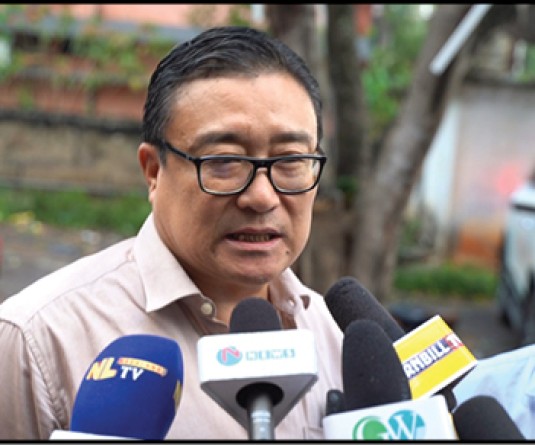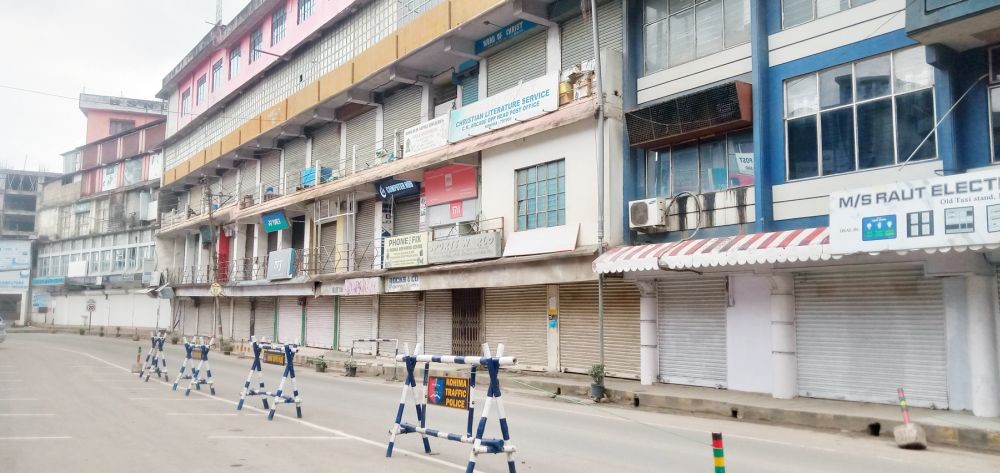
Morung Express News
Dimapur | August 18
It is not enough to understand current realities, there is a need to connect them with the roots was an underlying message at the launch of the book entitled ‘Wounded Tiger: The Papers of Khodao Yanthan’ today in Dimapur.
The book is an overview and celebration of the life and work of Late Khodao Yanthan, popularly called as “the grand old man of Naga political struggle”. He is regarded as one of the central founding fathers of the Naga Independence movement in the 20th century.
Launched today at Elim Hall, DABA, Dimapur, the book comes with an introduction and epilogue by Fr. Abraham Lotha, PhD, a Naga anthropologist who has published notable books like ‘The Hornbill Spirit: Nagas living their nationalism,’ ‘History of Naga Anthropology,’ and ‘The Raging Mithun.’
The significance of the book in the context of Naga Political History was underscored by several commentators at the launch as it contains original materials pertaining to the Naga struggle. The book was released by Dr Abemo Odyuo, Controller of Examinations, Nagaland University.
Introducing the book during the launch, Dr Lanusangla Tzudir, Chief Editor & Publisher of Heritage Publishing House stated: “I hope that today, we are all united in spirit, in celebrating the heart of a Naga patriot who believed that Naga sovereignty was fundamentally an inheritance handed down through ages. As written in his epitaph, he also believed that the survival of the Nagas depends upon their nationhood. He also urged that if the Nagas had failed to uphold their ancestral sovereign nation they would become a lost tribe, May God forbid it.”
Also touting Late Khodao Yathan as “An unsung Naga Patriot,” she stated that the book celebrates his legacy and contributions to the Naga cause. Quoting Khodao from the book she concluded, “Nagas must fight and struggle like a wounded tiger.”
While acknowledging the exemplary Statesman like qualities that Late Khodao Yanthan demonstrated during his lifetime, the gathering lamented on the present need for good leadership among the Nagas.
In the interactive session, members of the audience raised questions around qualities and values of good leadership and pointed out the need for Statesmen in the Naga context. The importance of studying and understanding the political and human experiences of the pioneers in the Naga movement was emphasized.
Sharing his writing experience, Fr Abraham Lotha said that as he was writing about Naga Nationalism, he tried to understand the personalities of the Naga movement and what led them to this type of calling.
“Many times in our society, we are engaged in our day to day affairs that we encounter and experience. Sometimes we don’t necessarily think about why things happen the way they do or when did things happen the way they do. We are so very preoccupied with current situations and realities - but they all have beginnings,” he stated.
He also made it clear that his approach to writing the book was purely as an Anthropologist and as a concerned Naga.
He explained further: “I understand Khodao as one of those roots that the present Naga generation should try and understand. He is the foundation and central figure to Naga society. It’s not enough to engage with today’s realities. It’s important to engage and understand with your roots that took place to what’s happened today. These are the perspectives through which I tried to understand him. ”
Highlighting the importance of the book, he termed it essential for academics, researchers and university students to encounter and engage with these types of books.
The book presents reproductions of the original papers that Khodao wrote in the mide-1960s as well as other historical documents that he had gathered since 1947. These original documents and personal papers are an archive of primary source material for Naga nationalism studies.
The book is available at the Heritage Publishing House, Dimapur and is priced at Rupees 650.




